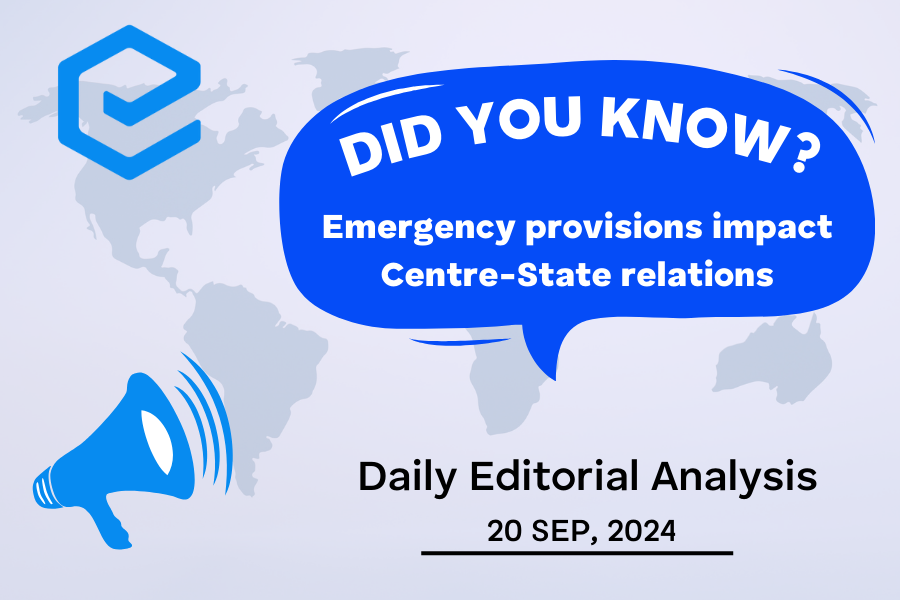Emergency provisions in India, as outlined in the Constitution, have a significant impact on Centre-State relations. These provisions allow the central government to take control of state functions during times of crisis, such as war, external aggression, or internal disturbances. When an emergency is declared, the power dynamics shift, with the Centre gaining more authority to manage the situation. This can lead to a temporary weakening of state autonomy, as the central government takes charge of law and order, financial matters, and other state responsibilities. While these provisions are meant to protect national security, they often raise concerns about federalism and the balance of power between the Centre and the states.

Tags: GS-2, Polity & Governance- Emergency provisions – Centre-State relations
Contents
- 0.1 Context:
- 0.2 What is the federal structure of governance in India?
- 0.3 Historical Context:
- 0.4 The Case of Manipur:
- 0.5 Constitutional Provisions of Emergency:
- 0.6 Challenges with provisions:
- 0.7 Way forward:
- 1 UPSC Civil Services Examination PYQ
- 2 To get free counseling/support on UPSC preparation from expert mentors please call 9773890604
Context:
- The recent surge in violence in Manipur has reignited debate on Centre-State relations and the use of emergency provisions by the Centre.
What is the federal structure of governance in India?
- Federal System: India follows a federal governance model with powers divided between the Centre and States, defined by the Seventh Schedule through the Union, State, and Concurrent Lists.
- State’s Role in Law and Order: Law and order are primarily the responsibility of State governments, reflecting the decentralised governance model under federalism.
- Cooperative Federalism: India’s federalism also stresses cooperation between the Centre and States, particularly on Concurrent List subjects.
Historical Context:
- Ambedkar Thought: Dr. B.R. Ambedkar hoped that Article 356 would not be implemented.
- Misuse of Article 356: It has been abused to dismiss state governments, usually for political reasons.
- S.R. Bommai Case (1994): The Supreme Court restricted the applicability of Article 356 to cases of constitutional departure, not law and order cases, and made it subject to judicial review
- Expansion of Article 355: Initially interpreted narrowly, its scope was expanded by decisions like the Naga People’s Movement (1998), which enabled the Institute to take comprehensive action to protect the States.
The Case of Manipur:
- The situation in the state, marked by widespread violence, looting of police ammunition, and targeted attacks, goes beyond a simple law-and-order breakdown.
- Yet, despite the severity of the crisis, Article 356 has not been invoked.
- This is likely due to political considerations, as the same party holds power both at the Centre and the State.
- However, Article 355 is being utilised, and the Centre is taking steps to restore normalcy through various instructions and actions.
Constitutional Provisions of Emergency:
- Article 352 (National Emergency): It can be proclaimed during war, external aggression, or armed rebellion. It affects the entire nation, with the Centre gaining extensive powers over the States.
- Article 356 (President’s Rule): It is imposed when a state government cannot function according to constitutional provisions. The Centre takes over State governance temporarily.
- Article 360 (Financial Emergency): It is declared when the financial stability of India or any part of it is threatened, allowing the Centre to control state financial matters.
- Article 355: It imposes a duty on the Centre to protect States from external aggression and internal disturbances, ensuring that State governance is per the Constitution.
- Article 358: During a national emergency, the provisions of Article 19 (Fundamental Rights) are suspended automatically for the duration of the emergency, except in cases of armed rebellion.
- Article 359: The President may suspend the enforcement of other Fundamental Rights (except those under Articles 20 and 21) during a National Emergency.
Challenges with provisions:
- Decentralisation of law and order: States are primarily responsible for law and order, but if parliamentary legislation fails, the Center can intervene, creating a jurisdictional conflict
- Abuse of Article 356: Historically, presidential administration has been devolved for political reasons rather than dismantling the actual political machinery, which has undermined national unity
- Judicial Review: Although the decision of the Supreme Court in S.R. The Bommai article outlawed torture, and the possibility of the Center going overboard in its interpretation of problems in states remains.
- Political expediency: Political interests can lead to delays in important interventions or policy choices especially when only one party is in power at the centre and the state.
Way forward:
- Sarkaria Commission (1987): Stated that Article 355 gives the Union both the duty and authority to ensure constitutional governance in States.
- National Commission (2002): Emphasised careful use of emergency provisions and Article 355’s role in offering support and corrective measures.
- Punchhi Commission (2010): Recommended Article 356 be used only in critical situations, with Article 355 addressing issues beforehand.
- Judicial oversight: Consistently strong judicial scrutiny to prevent abuse of emergency systems can protect them from unwanted interference.
- Strengthening state capacity: Empowering state governments to address law and order issues would reduce the need for intervention under emergency programmes.
- Political consensus: Political consensus on Center-State relations and formulation of emergency plans can ensure a balanced and unbiased intervention.
UPSC Civil Services Examination PYQ
Mains :
Q:1 Under what circumstances can the Financial Emergency be proclaimed by the President of India? What consequences follow when such a declaration remains in force? (2018)
Source: TH
To get free counseling/support on UPSC preparation from expert mentors please call 9773890604
- Join our Main Telegram Channel and access PYQs, Current Affairs and UPSC Guidance for free – Edukemy for IAS
- Learn Economy for free- Economy for UPSC
- Learn CSAT – CSAT for UPSC
- Mains Answer Writing Practice-Mains Answer Writing
- For UPSC Prelims Resources, Click here

